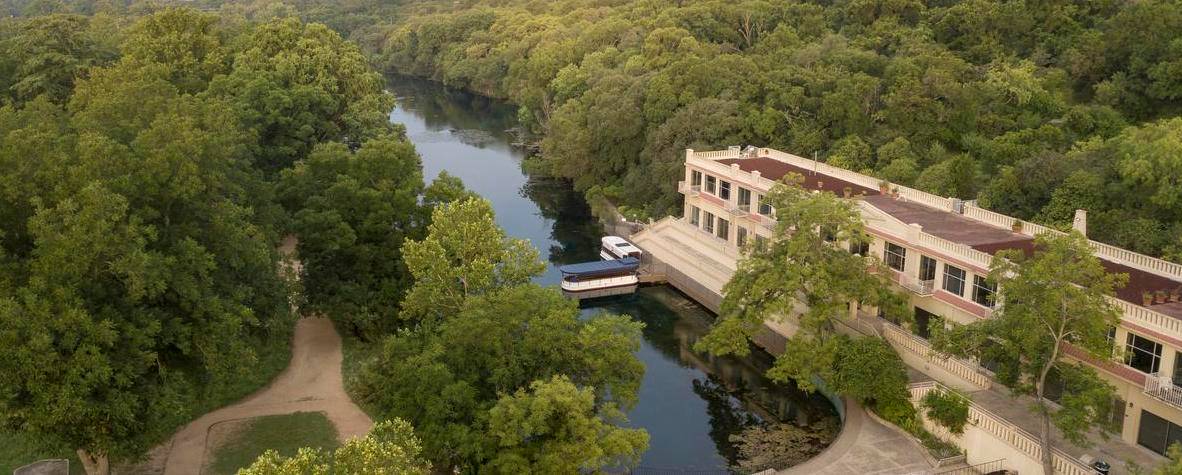Meadows Foundation grant spurs Texas State climate change research efforts
Jayme Blaschke | December 21, 2020

Texas State University has received a $500,000 grant from the Meadows Foundation to increase the research capacity of The Meadows Center for Water and the Environment to address climate change.
The grant will enable The Meadows Center to begin developing a large-scale program that can supply decision makers with crucial climate change information so they can make scientifically informed decisions about how climate change is affecting their water resources, and what their options are for building resiliency against those effects.
"To achieve that broad goal, one of the things we need to do is have conversations with scientists and stakeholders," said Robert Mace, executive director and chief water policy officer for The Meadows Center. "Climate change is touching everything associated with water, whether it's water supplies, environmental flows, spring flows—we're seeing those impacts and expecting more change in the future."
One of the challenges is developing actionable climate change data for Texas. Although much climate change research exists, the favored scientific models are global in terms of reach and detail. In order for that information to be usable, it has to undergo a process called downscaling so it may be applied to a regional level. There are many different approaches to downscaling, however, and choosing the best approach for Texas' needs is the first step of the process.
"One of our initial goals with this project is to bring climate scientists together to talk about what are the standards, what is the approach we should follow when we do that downscaling," Mace said. "Right now, a lot of the climate work that's being done in Texas is done on a specific watershed or done for a city. This research is being done by different experts and so is a mish-mash of approaches and techniques.
"Our ultimate goal is to have a consistent approach applied across the state where it's downscaled. Then that information will be used to investigate what climate change means for our surface water supplies, to help manage the waters in our rivers and our reservoirs as well as quantifying how much water is in our aquifers," he said. "There are various techniques and approaches you can use to make those analyses and estimates. Bringing groups of scientists and stakeholders together and talk about what's the best way for the state to have consistent methodology will have long-term benefits."
Other plans include surveys of communities, stakeholders and decision-makers to determine what their most crucial information needs are, so that The Meadows Center can tailor its planning tools in support to those needs. A Texas Essential Knowledge and Skills-aligned climate change educational curriculum is in the planning stages. Longer-term, Mace hopes to position The Meadows Center to conduct policy analysis for the state to better manage water resources and plan for future flooding events.
"We're thankful for the support of the Meadows Foundation as well as their leadership on this issue and being willing to invest in the Meadows Center and Texas State to make significant advances in the policy realm on climate change in Texas," Mace said.
ABOUT THE MEADOWS FOUNDATION
On July 14, 1948, Al and Virginia Meadows created The Meadows Foundation. It was meant to be an everlasting gift of gratitude to Texas, their adopted home state.
Algur H. Meadows was born in Vidalia, Georgia, in 1899. Virginia Stuart Garrison was born in Ryan, Oklahoma, in 1902 and spent most of her youth in Shreveport, Louisiana. After moving around the south, Al also settled in Shreveport where they met. They married in 1922. Al worked for Standard Oil by day and studied law at night.
Al left Standard Oil to start up his own oil and gas finance firm and later founded a production company. He and Virginia moved to Dallas in 1936. He eventually built General American Oil Company into one of the largest independent producers in the nation.
Al and Virginia chose Texas to receive the majority of their wealth because they believed the state and its people had been so generous to them.
Al and Virginia were also devoted to their family. Instead of leaving them a monetary fortune, they gave them the blessing and responsibility of governing the Foundation's work, which has been passed down from generation to generation.
Over the last 42 years, the Foundation has funded in the areas of arts and culture, civic and public affairs, education, health, and human services. Realizing some issues are so complex and urgent that they require concentrated attention and investment to move the needle, the Foundation has designated the environment, public education, and mental health as high-priority initiatives.
The Foundation also established the Wilson Historic District in 1981, a 22-acre nonprofit neighborhood of restored historic structures and newer buildings. As many as 39 nonprofit agencies are provided with rent-free office space in this unique collaborative philanthropic community. The District is carbon neutral with more than 1,000 trees offsetting 11 million miles of auto emissions.
Since its establishment, The Meadows Foundation has given more than $1.25 billion to 3,600 charitable organizations. Grants have been awarded in large urban areas, small rural communities, and every Texas county. The Foundation looks for programs and services that employ imaginative, innovative ways to solve community problems, and promotes projects and capital plans that lead to organizational self-sufficiency and sustainable growth.
For additional information, visit The Meadows Foundation at www.mfi.org.
Share this article
For more information, contact University Communications:Jayme Blaschke, 512-245-2555 Sandy Pantlik, 512-245-2922 |